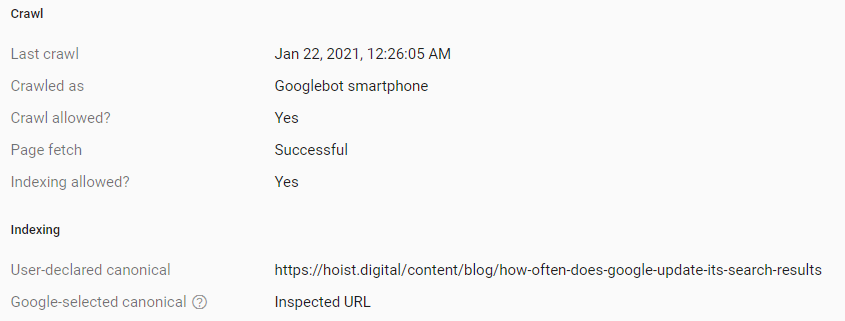
Subscribe to our newsletter!
We don't spam. You will only receive relevant and important tips for you and your business.
Unsubscribe anytime.
Here’s the truth: There isn’t an exact answer.
While we can’t give you an exact answer, websites can see rank changes in as little as 30 seconds or as long as a few weeks. It depends on how quickly your updates are noticed and processed by Google.
Google uses Googlebot, a web crawling software, to find and collect information on the internet to add to its index.
Googlebot consists of two different crawlers: a desktop crawler to simulate a user on a desktop and a mobile crawler to simulate a user on a mobile device.
The crawlers search websites for new and updated information to report back to Google. In the search engine world, this is called crawling.

Within Google Search Console, you can view your crawl stats to see when Google last visited your site.
To find this information, you can input any URL from your site into the search bar at the top of the page. After it has been inspected, you can view your crawl stats under “Coverage,” a tab on the left-hand side of the dashboard. You can see the date and time of the last crawl and which Googlebot crawled your site.

The frequency of Google’s updates is subjective; it depends on your website’s analytical performance, domain authority, backlinks, mobile-friendliness, page speed, and other factors.
The crawling process is algorithmic. In Google’s words, “computer programs determine which sites to crawl, how often and how many pages to fetch from each site.” If your site gets a lot of traffic, chances are it has relevant, user-friendly content. Sites with high-quality content will get crawled more frequently. If your site gets few visitors, Googlebot won’t crawl your site as often.
After Google is done crawling your website, Google processes the gathered information and adds it to Google’s searchable index.
A website’s popularity, crawlability, and structure all factor into how long it will take Google to index a site. In general, Googlebot will find its way to a new website between four days and four weeks. However, this is a projection and some users have claimed to be indexed in less than a day.
Help Google index and re-index your site faster:
Google Analytics: You’ll want to add your website to Google Analytics for tracking purposes regardless, but it could also alert Google that a new website is ready to be indexed. All you need to get started is a Google email address. Here’s Google’s guide on getting started with analytics.
Google Search Console: This is a free Google tool that allows you to monitor your site’s status in Google’s index and search results. Adding your website to Search Console is fairly easy, especially if you already have your website on Analytics. Here’s Google’s guide on getting started with Search Console.
Request A URL Inspection: If you have recently made changes to your website, you can request a URL inspection in Google Search Console. This will encourage Googlebot to recrawl your webpage. Once you have claimed your domain, you are allowed to request up to 10 individual URL recrawls per day. You can find this at the top of your Search Console dashboard.

Submit a Sitemap: A sitemap is a digital map that lays out all of the content of your website to help Googlebot discover which information you think is important to your site, when pages were last updated, and how often pages are changed. Once your sitemap is built, you can submit the sitemap URL under the “Sitemap” tab on the Search Console dashboard.

Indexing results vary on a site-by-site basis. If you own a small business--say a luxury kitchen cabinet shop--that doesn't have high search volume, your indexing rate will be slower because people aren’t actively searching for your services in high concentrations. But if your website represents a national appliance repair brand, your indexing rate will be higher.
In order to keep results relevant and useful, Google updates its search systems frequently. In 2010, the search engine made 350-400 changes, averaging about one per day. However, in 2018, Google made 3,200 changes to its search system - averaging multiple changes per day.
While the exact changes made are unknown, users have speculated that most had to do with ranking and user interface. Google stated that “some of these [changes] were visible launches of new features, while many others were regular updates meant to keep our results relevant as content on the web changes.”
The search engine also noted that some changes take time. While changes to the knowledge panel and auto-suggestion predictions happen quickly, featured snippets and other changes around the core web results can take much longer.
While there’s no way to know how often Google will make a change to its search results, there’s a good chance that it will occur at least once a day.
There are a handful of steps you can take to ensure that Google pays attention to your updates. Many experts say when something big happens to boost their SEO, like a backlink from an authoritative website or a press release, they see changes within a day or two. Also, those that invested in SEO prior to the boost were more likely to hold their new ranking.
Factors that contribute to quicker crawling and indexing:
Domain authority: A score (on a 100-point scale) developed by Moz that predicts how well a website will rank on search engines.
Page authority: A score (on a 100-point scale) developed by Moz that predicts how well a specific page will rank on search engines.
User-friendly content: The quality and searchability of content published to your site.
Website popularity: A combination of site traffic, click-through-rate, and time-on-site.
The higher your website ranks in each of these categories will lead to quicker crawling and indexing.
Appearing higher in Search results should not be your only goal. Focus on conversions and traffic instead. Keep in mind that Google crawls your site when something changes. Therefore, if you update your old content, Google will index your web pages more often. The more frequently Google indexes your site, the greater chance you will have at your content showing up in search results after publishing.
People are more inclined to click on articles that were most-recently published. Especially when reading about topics that are ever-changing, like SEO, healthcare or technology. Updating your content will give it a recent publishing date, therefore making users more likely to click through to your site.
After employing these changes, you should start to see your rank improve in due time. While you can’t know exactly how long it will take Google to index your new site or webpage, you can make an educated guess based on your site’s popularity, traffic, and content..